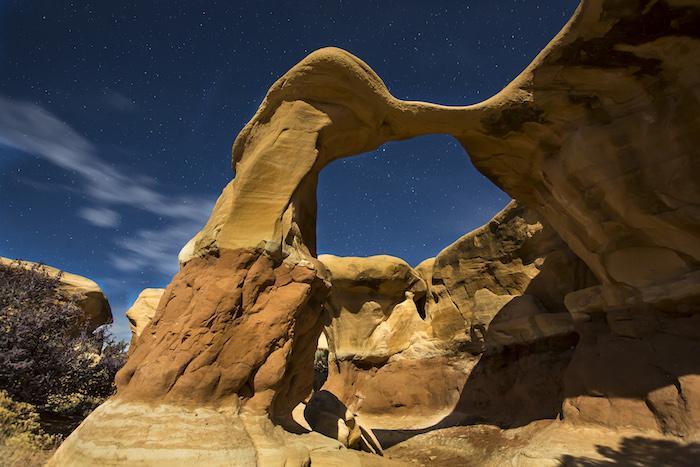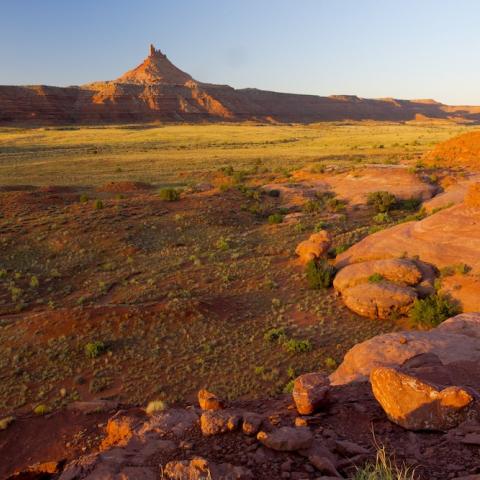
Metate Arch, Grand Staircase-Escalante National Monument/BLM
Editor's note: The following op-ed piece by Ron Maxwell initially ran on The American Conservative website.
The American people did not vote for Donald Trump because they wanted their forests logged, bounties placed on wolf packs, national monuments reduced in size, and a resumption of the universally outlawed ivory trade.
These odious policies are the direct result of the appointment of a swamp creature positioned by the crony class to further its own narrow financial interests and agenda: Interior Secretary Ryan Zinke. Thankfully the president reversed Zinke’s plans [1] for elephant trophies, calling them a “horror show,” which is what they are. But Trump recently traveled to Utah to announce the opening up of public lands [2] for commercial developers to pillage and plunder to their hearts content.
Bears Ears and Grand Staircase Escalante were first on the chopping block but Mr. Zinke has more in mind. At least eight more of our treasured national monuments, set aside for their beauty and the public’s enjoyment and use, are targeted for reduction. The Antiquities Act of 1906 gives the president the authority to set aside public lands as national monuments, and also to do the reverse. After reviewing these sites, Zinke has recommended that Trump reclassify and reduce the size of these national treasures.
No president has ever shrunk the sizes of monuments, but the Department of the Interior is filled with swamp denizens like Zinke and his deputy David Bernhardt, a former lobbyist for the oil and gas industry and big agribusiness, those most interested in using public land for private gain.
This reclassification means the acreage of the national monuments will be reduced, and the lands—some of the most spectacular scenic areas in the country—can be used for commercial development.
Unlike national parks, national monuments allow local residents and tourists alike to participate in recreational activities such as hunting, fishing, cattle-grazing, and hiking. This is why local businesses, sportsmen, and community groups tend to support keeping the monuments intact, as they provide dependable incomes for local economies, including the additions of jobs.
There is also widespread and bipartisan public support for preserving our national monuments. A new McLaughlin & Associates poll of 1,000 likely voters found that 90 percent of Americans support the creation of more monuments or at least keeping the current ones protected. Maintaining these lands also has the backing of local Native American tribes and chambers of commerce.
Organ Mountains-Desert Peaks in New Mexico is a prime example of how local areas surrounding national monuments can benefit from tourist opportunities. In 2016, tourism hit an all-time high following the monument’s mention in Lonely Planet’s “Top 10 Places to Visit” travel guide, which resulted in a 50 percent increase in visitors over the past year. The monument features petroglyph-line canyons, with thousands of Native American archeological sites, and many historical landmarks and training sites.
If the personal income of those who live near the Organ Mountains can increase by 42 percent, community involvement in supporting national monuments can lead to economic prosperity throughout the country.
Nonetheless, Secretary Zinke has recommended reclassifying Organ Mountains Desert Peaks for oil drilling and mining.
Gold Butte National Monument features significant cultural, historical, and natural treasures: thousands of Native American artifacts, historic mining and pioneering artifacts, rare and threatened wildlife, and dramatic geologic features. Broad and deep local support is a principal reason for its designation, which, in turn, has benefitted the community greatly.
Gold Butte also encourages tourism and increases expenditures for local businesses. An economic study conducted by Applied Analysis found that if only 10 percent of new visitors decided to spend one night in Mesquite, Nevada, the total economic impact for the community would be $2.7 million per year. Think about what that could mean if visitors were to spend the week.
Nevertheless, Secretary Zinke proposes that Gold Butte National Monument should be opened to “traditional uses,” including mining and drilling.
Aside from their captivating scenery and cultural and historical sites, monuments already provide an economic boost for nearby communities without risking damage to their environments. Additionally, their archaeological sites are a link to our prehistoric past and a vital tether to Native American cultural history.
Secretary Zinke’s misguided policies are toxic for local communities and even worse for American economic prosperity. President Trump knows business, but he also understands the need to protect these lands and the local economies they serve. He is wise to question the plans of his swamp creature and should continue to do so.
Ron Maxwell is writer and director of the award-winning film Gettysburg.



 Support Essential Coverage of Essential Places
Support Essential Coverage of Essential Places







Comments
Orrin Hatch just announced that he will not run again for his Senate seat.
Speculation is high that this will lead to the re-entry of Mitt.
Thank you d-2.
Alfred, I fear that climate change is the thing that will kill this planet for us and most other higher life forms. Anything to keep those temperatures down, and I don't care if it kills individuals at all. My moral compass is against climate change and you seem to be clueless as to the ramifications. What is real strange is that no one on this continent seems to be upset about the amount of plastic everywhere. It's in our fish already
Argalite, there are many things on this Earth that can kill you--and rising temperatures are the least of them. There again, adjustments will be made--just as they were made when Americans invented air conditioning. and turned virtually uninhabitable parts of the country into boom towns. To be sure, where would the country be without air conditioning? For one thing, there would be no Donald Trump. He won most solidly where Americans changed the environment the most (TVA, for example). Or is the only course in environmental history you ever took Hand-Wringing 101?
Clueless? No, educated. And today that difference is extreme. The cabal of alarmists running America's universities today (and media) have no clue what to be educated means. This much they do know. If you question them, you might learn to question everything. And that they cannot allow. So they invent courses in hand-wringing--rather than thought--and push you out the door.
Ramifications? There have always been ramifications, of which the biggest is still mortality. When you are born, you are going to die. Try hand-wringing yourself past that.
In 1947, when I was born, whole parts of this country were still virtually unsettled. What settled them? Human ingenuity, starting with all of FDR's programs during the New Deal. Today, there is not a free-flowing river in the greater Tennessee Valley--or most of the American West, for that matter. You want to talk about climate change? It is still barely a ripple of reality against changes as big as that.
To keep you paying the subsidies, you need to be kept afraid. First the cabal took away all your free-flowing rivers and streams. Now they want to take away your deserts and eagles, too. It's not President Trump you should be afraid of. It's the people who still believe in growth--and will do anything to keep the country growing, now to scream climate change if you don't believe in their "solutions," e.g., renewable energy and driverless cars.
Funny, isn't it, how we seem to need all of these things to support the growth of air conditioning. Hmmm. But I thought environmentalism was learning to do without, But there you have it--why "nature" again needs to go.
Plastic everywhere? You're right, but there are other villains, too, among them concrete and asphalt, still needed to support "driverless" cars.
You want out? The world will one day let you out. Me? I intend to be cremated. Then I'll have my family take my ashes to the Tetons, and no, I won't ask the Park Service for a permit. They would probably deny my ashes as an "intrusion" on the environment, while allowing more widening and straighening of every road.
Me worry about the future? Why? The future will take care of itself. It will either turn out well or badly, but no, I don't expect to drown in rising seas. You worry about that if you want to. I've worried enough in 70 years about things that never happened, only to regret not worrying more about what actually did.
Alfred,
I do not worry about the future, because worrying does nothing. When people plan for things, often they are more prepared. Please do not attack my education, as I can see when man puts so much carbon into the air, something is going to happen. You don't seem to understand that. You sure write allot about nothing. Have a problem?
And I'm certain that all those climate scientists with their highfalootin' education are less understanding of what's happening than Trump, who apparently does not read. Don't worry about Al - he still reads, but I'm uncertain when he last studied, taught, or published. He did a fine book once.
Problem is, you don't have a clue what. The alarmists have made dozen of claims (predictions) based on AGW theory but for the most part they have proven wrong. Will it be bad? Will it be good? Will it not make a bit of difference? None of us know for sure, but I am confident that I, my children, my grandchildren and many generations beyond will die of something other than carbon enduced dangers. In fact, I am more fearful of the AGW alarmists for the wellfare of my decendents than I am of GW, no matter what the cause.